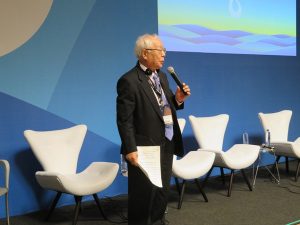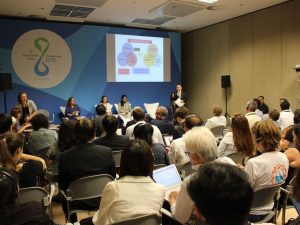Japan Water Forum has been actively engaged in the thematic process of the 8th World Water Forum, Brasilia. It took a leading role of session coordination of “Involving All Through a Stakeholder Driven Process” and also made a significant contribution to the different sessions under the theme of “CLIMATE”, “DEVELOPMENT”, “URBAN”, and “SHARING” by sharing Japan’s experiences.
Roles of Japan Water Forum in the Thematic Process
- Lead Organization of the Session Coordination Group – Session, “Involving All Through a Stakeholder Driven Process”
- Member of the Topic Coordination Group – Topic c. “Efficient use of surface water and groundwater – urban and rural” (Theme 3. DEVELOPMENT)
- Member of the Topic Coordination Group – Topic b. “Involving all: public, private, civil society – women and men – young and old – in bottom up and top down approaches” (Theme 7. SHARING)
- Panelist – Session, “Low Carbon Water Services to Achieve Climate Mitigation” (Theme 1. CLIMATE – Topic c. Water and climate change mitigation)
- Panelist – Session, “Promoting circular economy by building an enabling environment
” (Theme 4. URBAN – Topic b. The circular economy – reduce, reuse, recycle)
1. “Involving All Through a Stakeholder Driven Process”
The session has attracted a large audience, more than 60 people. The key messages and recommendations derived from the active discussion at the session will be incorporated into the outcome document of the 8th World Water Forum.

|
 |
| Opening Remarks by Dr. Takemura, Chair of JWF | Panel Discussion |
(1) Outline of the Session
Key Questions
– Advantages of involving all during the entire process
– How to mitigate the challenges resulting from participatory approaches
| Theme / Topic | Theme 7. Sharing – Topic b. Involving all: public, private, civil society – women and men – young and old – in bottom up and top down approaches |
| Session Title | 3. Involving All Through a Stakeholder Driven Process |
| Time and Date | Wednesday, 21 March 2018, 9:00 – 10:30 |
| Venue | Room 26, Ulysses Guimarães Convention Center, Brasilia-DF, Brazil |
| Session Coordination Group | Japan Water Forum (Lead), Youth Delegates Program of the World Water Council, Central Asian Youth Forum for Water, World Wildlife Fund US, University of Brasília – Center for Sustainable Development |
(2) Agenda
| 9:00 | Opening & Citizen’s Process Video - Mr. Shigenori Asai, Deputy Director, Japan Water Forum |
| 9:07 | Opening Remarks by Dr. Kotaro Takemura, Chair, Japan Water Forum |
| 9:10 | Keynote Presentation
|
| 9:20 | Panel Discussion Panelists:
|
| 10:27 | Closing |
(3) Discussion Summary
Challenges
- “Involving All” during the entire process of water management is a key to sound decision-making for better water management and more efforts are needed to have stakeholders engaged and empowered.
- Several difficulties are found in “Involving All” to implement stakeholder engagement practices, which may arise including:
– Building an effective mechanism allowing any types of stakeholders to be equally involved in the process requires a long-term commitment at all levels.
– The more stakeholders are involved, the more difficult it could be to reach a consensus or to make a decision.
Key Messages & Recommendations
- An “Involving all” can bring the good results in the long run including ensuring ownership and long-term sustainability of solutions.
- Political will promoting stakeholders’ engagement is required and the governments need to be flexible in order to have dialogues and consultations lead to real influence on the development process.
- Setting up legal/institutional frameworks alone is not enough to be the solution unless they operate properly. It also requires best efforts on awareness-raising, communication, capacity building, and financing.
- Those who facilitate continued dialogues and coordinate the interests of different stakeholders are needed.
- Effective involvement of and collaboration among stakeholders with clearly defined responsibilities and accountabilities, sharing the burden and benefits are required for sustainable water management.
(Reported by Shigenori ASAI, Deputy Director, JWF)
